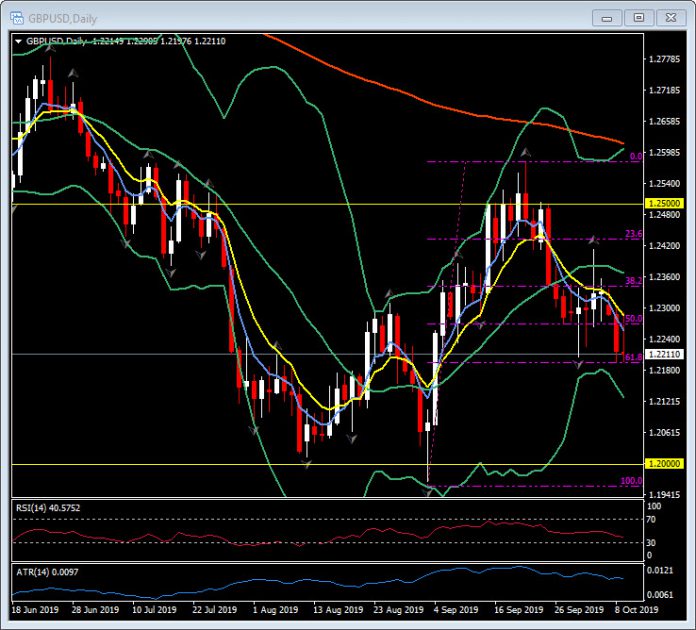GBPUSD, Daily
A delay to January 31 is all but inevitable — assuming, that is, PM Johnson’s ongoing threat to leave without a deal on October 31 is a grand bluff aimed at amplifying his “people vs parliament” narrative ahead of the upcoming general election (date TBC). A memo from No.10 conveniently found its way to the pro-Brexit Spectator magazine, showing the government to be musing threats to EU states supporting a Brexit delay and ideas on how to scupper the Benn bill (the new law blocking a no-deal Brexit on October 31), looks to be all part of the bluster. It would be politically risky for Johnson to actually try and force a no-deal exit through at the end of the month, as, aside from breaking the law, he would then go into a general election amid what even hardline Brexiteers must know would be a chaotic backdrop. The UK would have suddenly severed itself from over 750 separate agreements worldwide (according to FT research), requiring re-negotiation at not only the UK-EU level but also deal-by-deal authorisation of every third country involved, all at a time when UK imports get more expensive and UK exports more dear as the country shifts to backstop WTO trading terms.
It makes far more sense for Johnson to keep pushing his people vs parliament line while making a show that he is doing all he can to bring about a Brexit on schedule, then blaming the delay on the pesky pro-EU parliamentarian elite. Polls suggest that Johnson’s Conservative Party stands as favourite heading into the election. There is speculation that he and his Cabinet are thinking of making a no-deal Brexit the Conservative Party’s official position going into the election, no doubt to siphon votes back from the Brexit Party, though this may also risk putting off less ideological Brexit voters. While the Conservatives are leading the polls, the pro-EU parties are strategising electoral pacts and alliances, and will be a force to be reckoned with as the electorate is viewing the election as a pro-Brexit vs pro-EU shoot out. Polls suggest there is about 52% support for remaining in the EU versus 48% against — the mirror image of the vote in 2016. The biggest risk for Johnson might be if Labour and the Liberal Democrats agreed to form a coalition.
Click here to access the Economic Calendar
Stuart Cowell
Head Market Analyst
Disclaimer: This material is provided as a general marketing communication for information purposes only and does not constitute an independent investment research. Nothing in this communication contains, or should be considered as containing, an investment advice or an investment recommendation or a solicitation for the purpose of buying or selling of any financial instrument. All information provided is gathered from reputable sources and any information containing an indication of past performance is not a guarantee or reliable indicator of future performance. Users acknowledge that any investment in Leveraged Products is characterized by a certain degree of uncertainty and that any investment of this nature involves a high level of risk for which the users are solely responsible and liable. We assume no liability for any loss arising from any investment made based on the information provided in this communication. This communication must not be reproduced or further distributed without our prior written permission.


















